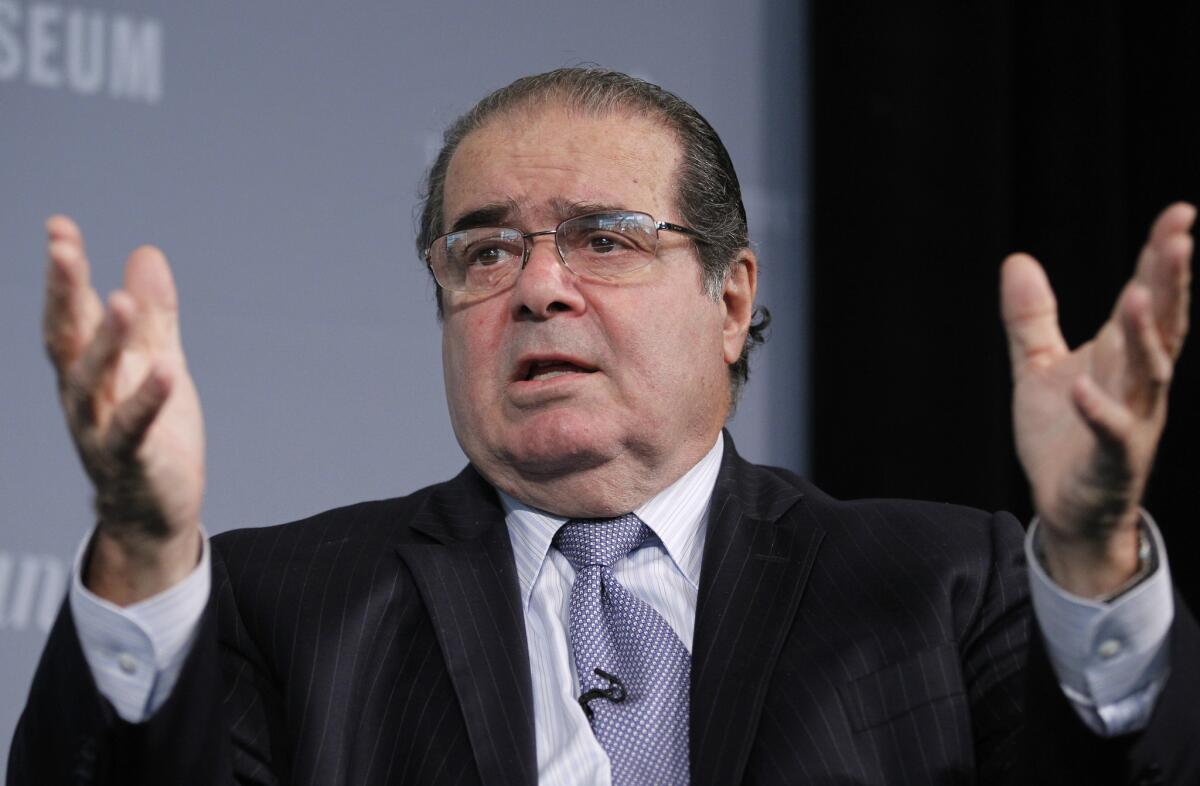Column: Obama wants to reduce ‘meanness’? Justice Scalia’s death gives him that chance.

Supreme Court Justice Antonin Scalia participates at a forum at the Newseum in Washington in 2011.
In Springfield, Ill., last week, President Obama commemorated the ninth anniversary of his bid for the White House. He admitted that one of his “few regrets” was his inability “to reduce the polarization and the meanness in our politics.”
To conservative ears, Obama’s comments fell somewhere between risible and infuriating. Obama has always done his best to demonize and marginalize his opponents. Either the president honestly cannot see that or he’s cynically pretending that the fault lies entirely with his critics. If only there were some way to figure out whether he’s sincere.
Well, let no one say the moral arc of the universe does not bend toward second chances.
Partisans on all sides are sharpening their spears and honing their machetes for what could easily be the meanest and most-polarizing nomination battle in modern American history.
Just a few days after Obama’s remarks, Supreme Court Justice Antonin Scalia died. Scalia was not only one of the more gifted writers and intellectuals to ever don the robe, he was also a founding father of the originalist counterrevolution and the elder statesman of the court’s conservative wing.
So it is no wonder that conservatives should grow instantly queasy at the thought that Obama will replace him with yet another high priest of the cult of the “living Constitution.”
Already, partisans are sharpening their spears for what could easily be the meanest and most-polarizing nomination battle in modern American history. It will get ugly, very ugly. Congress will grind to a halt. Interest groups will pour millions into the effort on both sides. Careers will be ruined. Public trust will plunge even deeper, if that’s even possible.
Some commentators have already moved to DEFCON 1. Within 48 hours of the news that Senate Majority Leader Mitch McConnell would block any nominee Obama sent his way, New York Times editorial writer Brent Staples opined on Twitter, “In a nation built on slavery, white men propose denying the first black president his Constitutional right to name Supreme Court nominee.” Never mind that this would be Obama’s third such appointment; Staples’ tweet is but a drop in the river of poison to come.
Obama could prevent all this strife. He could say that he will leave this appointment up to his successor. Or he could appoint a conservative during the Senate recess (Sen. Ted Cruz, anyone?) who would serve only until the end of the following session. That would preserve the power balance on the court for the time being.
Such diplomacy would go a long way to reduce — or at least prevent — further polarization and meanness in our politics.
Chances Obama will go this route? Zero. Instead he’ll pick a liberal whom he’ll call a moderate and insist on an up-or-down vote.
And I don’t blame him. If I were president, I would seize the opportunity to appoint a like-minded justice. So would pretty much any Republican or any other Democratic president. On the other hand, I don’t fetishize bipartisanship and unity the way Obama does — if only rhetorically.
Republicans arguably erred when they implied that Obama shouldn’t name a replacement for Scalia. The president has every right to do so. And the Senate has every right to withhold its consent. It’s really as simple as that.
On the Democratic side, some are claiming that the GOP would be violating a sacred and inviolable norm by preventing another Obama appointee. That’s ridiculous on its face. Democrats have been blowing up the appointment process piecemeal since they turned Judge Robert Bork’s last name into a verb back in 1987.
As my National Review colleague Jim Geraghty has pointed out, Sen. Charles E. Schumer (D-N.Y.) gave a blistering speech in 2007 vowing to do everything he could to prevent President George W. Bush from appointing any more conservatives to the bench. Schumer said John G. Roberts Jr. and Samuel A. Alito Jr. were quite enough for one president. Switch the names in that speech from Roberts, Alito and Bush to Elena Kagan, Sonia Sotomayor and Obama and you have McConnell’s position now.
Any claim that Republicans are the first to break the peace is as absurd as the suggestion that Obama is blameless for the polarization and meanness in our
politics.
Follow the Opinion section on Twitter @latimesopinion and Facebook
More to Read
Sign up for Essential California
The most important California stories and recommendations in your inbox every morning.
You may occasionally receive promotional content from the Los Angeles Times.











